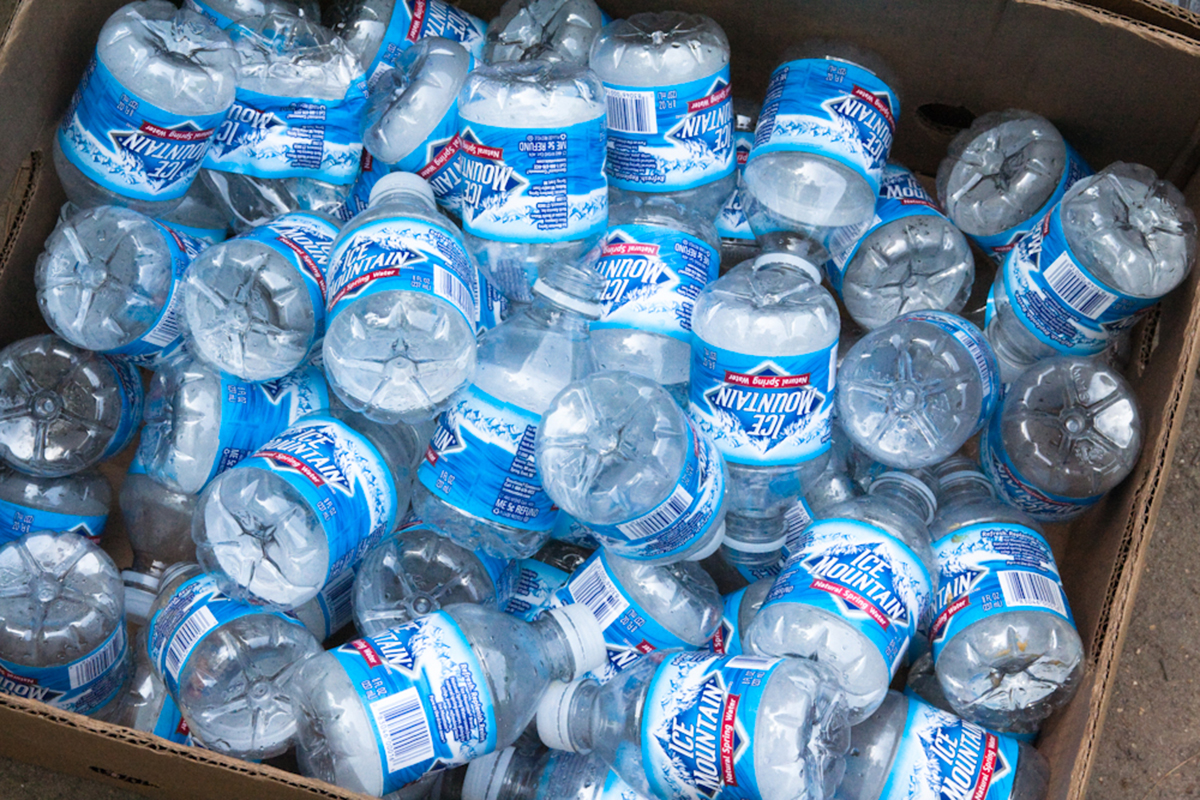Bis-phenol A, also known as BPA, is one of the world's most common industrial chemicals. It is used to make plastics that are clear and tough. It is also used to make epoxy resins, a kind of glue that appears in almost all food and beverage containers. BPA is used to make PVC pipe, dental glues, sports equipment, and the lenses used in eyeglasses. Worldwide, chemical plants make about 1.1 millions tons of BPA every year for use in making plastics.

In the United States, just about everyone has been exposed to enough BPA that it spills over into their urine. A study by the CDC found that 95% of adults in the 1990's, and 93% of children and adults in 2004, had consumed enough BPA that it was found in their urine. People who eat lots of fresh fruits and vegetables tend to have lower levels of BPA (probably because they aren't using as many cans and microwave containers that contain BPA) than people who eat mostly prepared foods.
What's the Problem with BPA?
Scientists conducting studies with lab rats noticed that BPA has some of the same effects in the human body as estrogen as early as the 1930's. The chemical was not widely used, however, until the late 1950's, and by that time, these studies had been forgotten. Only in 1997 did scientists establish that BPA acts as a xenoestrogen, a source of estrogen from outside the body. It has a molecular configuration that is very similar to 17-beta-estradiol, and it "locks on" to some of the same receptor sites on the surfaces of cells as estradiol.
It temporarily increases the production of testosterone, but a man's body converts the excess testosterone into estrogen in his fat cells. The greater a man's fat mass, the greater his production of estrogen, with its feminizing characteristics. Making matters worse, estrogen encourages the growth of fat, especially in the buttocks, which are 10 times more efficient at converting testosterone into estrogen than fat in other parts of a man's body. Still worse, the surge in estrogen increases appetite.
BPA Causes Us to Eat Too Much
BPA, like 17-beta-estradiol, suppresses circuits in the brain that regulate appetite. When BPA locks onto certain receptor sites in the brain, we want to eat, and eat, and eat. If we want to eat chips and crisps, which are sealed into plastic bags with BPA, and drink sugar-sweetened beverages, which are sealed into cans with BPA, and microwaveable meals, which are sealed with clear plastic made with BPA, the act of eating indirectly increases our appetite.
See Also: Triclosan: The Carcinogenic Chemical Lurking In Many Of Your Products
BPA is disruptive for adults seeking to maintain a healthy weight, but recent research from the University of Michigan suggests that it may be even more disruptive for infants who are exposed to the chemical before birth. The reason BPA is especially toxic to the fetus is not especially hard to understand.
How BPA Causes Damage Before Birth, and What to Do About It
When an expectant mother eats foods contaminated with BPA, her unborn child also receives the chemical. Unlike the mother, however, the child is relying on the mother's metabolism to "detoxify" his or her nutrients. Because the fetal liver is not yet actively processing toxins, the fetus accumulates BPA at a rate 7 to 8 times faster than an adult.

Dr Almundena Veiga-Lopez of the University of Michigan (Ann Arbor) and her colleagues measured BPA exposure in 24 women who had uncomplicated pregnancies. The scientists took blood samples from the mothers in their first trimester, and measured BPA levels. They then took samples of umbilical cord blood after the mothers gave birth. The blood in the umbilical cord is from the baby, and indicates the state of health of the child independent of his or her mother.
The particular kind of oxidative stress the scientists measured is associated with problems in using fats. The babies had higher levels of a palmitic acid, indicating greater inflammation and metabolic stress. In other studies (this study is too small to power long-term observations), this kind of inflammation is associated with obesity and the development of type 2 diabetes.
The makers of plastics, of course, can present teams of scientists to justify a different interpretation of the facts. However, there is no doubt that as more and more people consume foods and beverages from plastic containers, more and more people have become obese. The process may not be as simple as "plastics made me fat," but there is a growing body of evidence that exposure to BPA before birth and throughout life increases risk of obesity and diabetes.
What can you do?
- Don't eat food that has been stored in plastic containers, unless they have been certified to be BPA-free.
- Don't eat food from cans that are not stored in cans, unless they have been certified to be BPA-free.
- If you can't afford fresh produce, meat, and fish, at least avoid storing plastic containers and cans in hot environments. Don't leave a case of Coke in the trunk of your in car in summer, and don't use water bottles you keep in your car during the summer unless they are BPA-free.
- If you choose microwaveable foods, take food out of its plastic container before microwaving it. Heating in the microwave releases BPA into food.
- Be especially careful to avoid acidic foods that have been stored in plastic containers. Most soft drinks contain phosphoric acid, which may increase the leaching of BPA into the drink.
See Also: Toxic Beauty: Dangerous Chemicals Found In Your Makeup
Fruits and vegetables are not necessarily "detoxifying," but fresh fruit and vegetables that have not been stored in liquids in direct contact with plastic don't add to your burden of BPA. (Carrying produce home in a plastic bag is OK, just don't let it get mushy or hot in a plastic bag.) If you can't eliminate all canned foods from your diet, at least be careful with canned citrus juices and canned tomatoes, avoiding them if you can, and making sure they are never stored in hot places if you can't.
- Tucker, M. Endocrine Disruptor BPA Increases Fetal Oxidative Stress. Medscape Medical News. 21 January 2015.'Photo courtesy of Stevendepolo via Flickr: www.flickr.com/photos/stevendepolo/4626047848
- Photo courtesy of M Glasgow via Flickr: www.flickr.com/photos/glasgows/338937124
- www.bisphenol-a.org/
- http://www.medscape.com/viewarticle/838387 (Registration may be required.)


Your thoughts on this